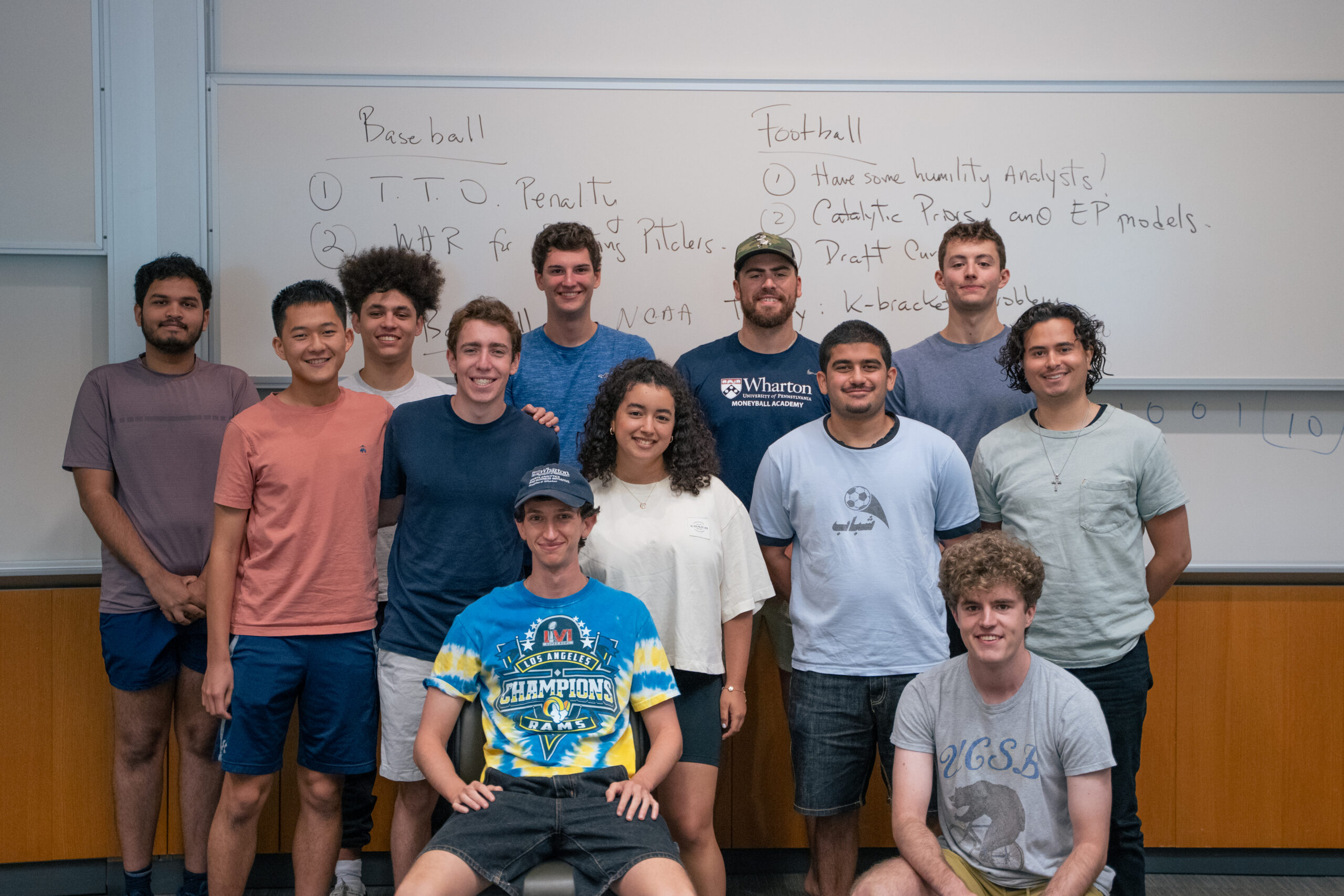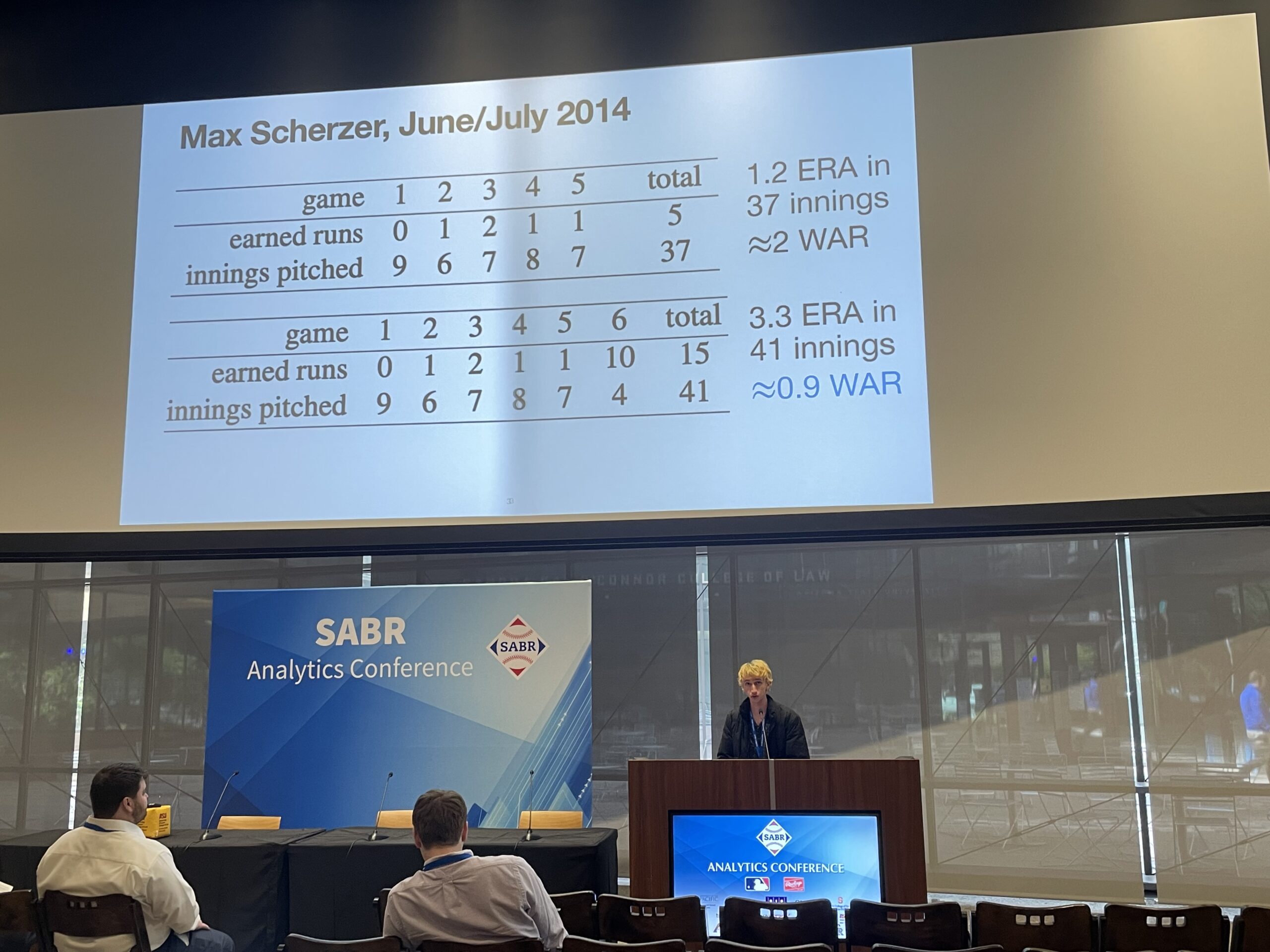Wharton Sports Analytics and Business Initiative
News
Transforming Sports Through Analytics: Ryan Brill, PhD’25, Joins the Utah Jazz
Ryan Brill, PhD’25, is currently a basketball data scientist with the NBA’s Utah Jazz, helping to crunch numbers and find advantages on the court. If you had told him during his high school years in Los Angeles that this was his future, he may not have believed you. Although he’s always been competitive, he says he wasn’t a huge sports fan at that time – his interests there didn’t extend much further than poker or fantasy football, areas in which his passion for math neatly intersected with sports.
Brill would go on to study mathematics and statistics at UC Berkley, with a minor in computer science. “I always wanted to get the best grade in class. I was making bets with other students, even with my teacher, about who would score higher,” he says. Despite that passion for academia, though, his one brush with industry left him disillusioned. “I had this finance internship sophomore year, and after the first day of assignments on Excel, I thought, this is so boring. So instead, I just read a math textbook on finance for the whole internship. I knew then I had to go to grad school. I wasn’t going to survive a regular job.”

Discovering WSABI
After undergrad, Brill eventually found his way to an Applied Mathematics PhD program at the University of Pennsylvania, which appealed to him for its academic flexibility. His first year at Penn was during COVID-19, and classes were entirely online. “It was brutal,” he said. “For a PhD, you’re supposed to be making connections with professors, having lunch, talking about ideas. For me, it was just sitting at home in front of Zoom.” He began searching through faculty bios online and found Adi Wyner, faculty co-director of the Wharton Sports Analytics and Business Initiative (WSABI), and professor of statistics and data science. Brill, by this time more interested in sports – particularly basketball and football – thought this could make for an interesting use of the academic freedom afforded to him at Penn. He got in touch with Wyner.
What began as Zoom calls grew into a transformative relationship. “Without him, I might not have even made it through the PhD. I might have dropped out. He absolutely unilaterally changed my life,” said Brill. Their collaboration flourished through WSABI, where Brill’s research, teaching, and mentorship all intersected.
Teaching and Mentorship Through WSABI
The collaboration between Brill and Wyner started with WSABI’s Moneyball Academy, a three-week summer program designed for rising high school juniors and seniors from around the world to learn about sports analytics on campus at Wharton. Brill spent five straight summers teaching coding and guiding high school students through projects. He found himself energized by their enthusiasm and curiosity. “They actually cared, which is increasingly rare in a classroom,” he said. In one memorable case, a student uninterested in sports confided that his dad forced him to attend. His real passion was music. Brill helped to meet the student where his interests were and, together, the two collaborated on a rap song.
Building on his experience with the Moneyball Academy, Brill hand-created the curriculum for the Wharton Sports Analytics Research Lab, designing 20 lectures and assignments to provide attending college students with a rigorous introduction to graduate-level statistics. “If I were starting over as a first-year grad student, what would I have wanted to learn? That became the curriculum for the Lab,” he explained. Though he later adjusted the structure to be less intense, the Lab embodied his belief that true learning comes from tackling meaningful questions with real-world data.

An Incubator for Ideas and Research
Brill also became a regular participant in the WSABI Friday Seminar, where undergraduates, graduate students, faculty, and even professional athletes gathered to brainstorm with Wyner. “That was our incubator,” he said. “It always came back to sports and statistics, and that became the basis for years of research.” Those sessions seeded projects that Brill and Wyner later developed into fully fledged research projects and publications:
- NFL Big Data Bowl: Brill was a two-time finalist. In 2022, his team’s project on optimal run paths for kick returners earned a top-five finish and $15,000 in prize money. In 2025, he returned with what he called a “great project,” this time presenting at the NFL Combine in Indianapolis.
- Published Papers: Together with Professor Wyner, Brill co-authored six published papers, with additional projects under review. Their work frequently emerged from WSABI seminar discussions and emphasized rigorous, practical applications of analytics.
- Fourth-Down Analytics Debate: His paper, Analytics Have Some Humility, scrutinized widely used fourth-down models. Brill’s presentation sparked intense online debate, with one thread drawing more than 100,000 views.
- Conferences and Talks: Brill presented at the NESSIS Conference at Harvard, the Carnegie Mellon Sports Analytics Conference, the CASSIS Conference in Vancouver, the SABR Analytics Conference in Phoenix, and the Joint Statistical Meetings in Washington, D.C. “At first, my presentations weren’t great,” he admitted. “But over time I got better, and it was amazing to speak to the smartest minds in the field who actually cared about what I was saying.”
A Lasting Partnership
Through it all, Brill credits his advisor. “Adi was so flexible. He let me figure things out. When we talked, he always pushed me. He’s the G.O.A.T. for sure.” Their conversations, often informal, often over meals, always returned to the same theme: sports and statistics.
Reflecting on WSABI, Brill emphasized its role in broadening his impact. “I spent five years of my life studying this stuff, and very few people outside of Penn really cared. But at the Lab, I had students who did care. That was huge. It’s almost selfish to just learn all these things and keep them to yourself. It’s really a blessing and a privilege to make other people’s lives better through it.”
“Ryan came in as a math student with little background in statistics, and in five years he became extraordinary at research, writing, and lecturing,” said Wyner, reflecting on their time together. “One of the most beautiful things as an advisor is to watch a student grow from a clean slate into someone generating original ideas, writing with clarity, and giving polished presentations. With Ryan, it was a slam dunk.”
Today, Brill begins a new chapter as a Basketball Data Scientist with the Utah Jazz. “I wanted to be as close to the high-stakes decisions as possible,” he said. But even as he moves into professional sports, his legacy at Penn remains: a rigorous Lab curriculum, spirited Moneyball summers, and a partnership with Professor Wyner that defined his PhD journey.


